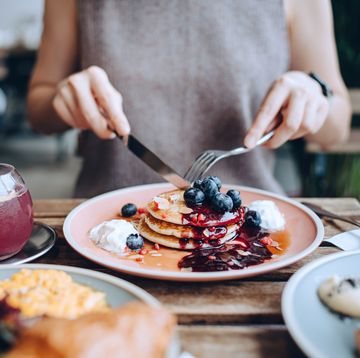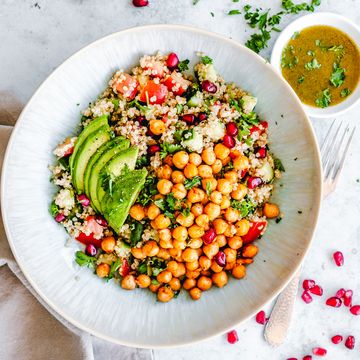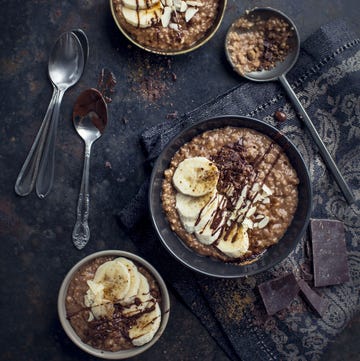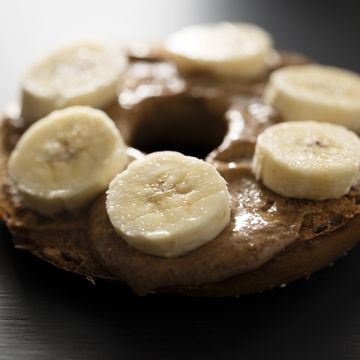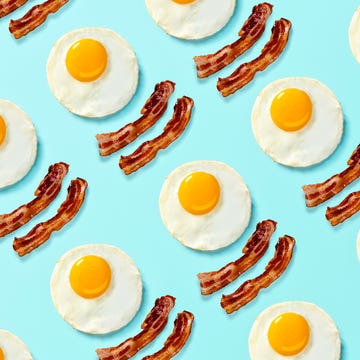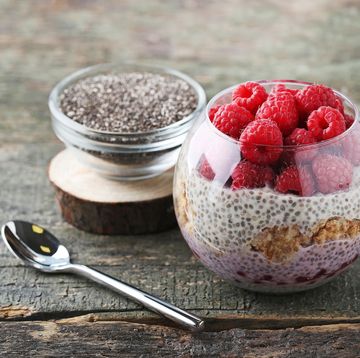For some runners, a gluten-free diet is a matter of medical necessity. Others adopt it to improve performance, lose weight, or fight inflammation that interferes with recovery.
In fact, one survey found about 40 percent of athletes pass on gluten—about four times the percentage of the population with a diagnosable sensitivity to the stuff. And nearly one-fourth of those who hadn’t gone gluten-free believed doing so might give them a competitive edge.
But sports nutrition experts say optimising nutrition doesn’t always mean avoiding gluten, a protein in wheat, rye, and barley—and doing so might come at a cost. Here’s what runners need to know about going gluten-free.
Here’s how much protein you should be eating?
Most critically, runners with an autoimmune condition called coeliac disease need a gluten-free diet as that's currently the only treatment. Coeliac disease causes your body to respond to gluten by damaging your own small intestine. Eventually, this interferes with the way you absorb nutrients and can cause problems with your bones, nerves, and hormones.
Other runners may have what’s called a gluten intolerance or gluten sensitivity, says Susan Kitchen, R.D., a marathoner, Ironman triathlete, and endurance coach in Chapel Hill, North Carolina. Though gluten doesn’t cause their bodies to launch an all-out attack, eating it can trigger similar symptoms, including fatigue, headaches, joint pain, and digestive disturbances like bloating, diarrhea, and nausea.
In total, about 5 to 10 percent of the population falls into one of those two categories. And A version of this article appeared on have a wheat allergy, an autoimmune reaction that can cause itchy eyes and breathing trouble but doesn’t damage the small intestine like celiac disease.
Running can exacerbate existing sensitivities to gluten, says Hana Abdulaziz Feeney, M.S., R.D., a runner and founder of Tucson, Arizona-based Nourishing Results. Dehydration, high temperatures, and blood flowing away from your digestive system to your hard-working muscles creates a temporary inflammatory environment in your gut.
And because gluten is a large protein, some athletes who aren’t otherwise gluten intolerant may not be able to tolerate it during a long race or a heavy training cycle, Feeney adds. They may feel better if they cut back on or avoid gluten during those time periods, or even a day or two before a race.
Related: 8 commandments of good running nutrition
Who doesn't need a gluten-free diet?
Just about anyone else, says Laura Moretti, R.D., a runner, triathlete, and sports dietitian at Boston Children’s Hospital. Though some elite endurance athletes have reported a boost after giving up gluten, the research doesn't support this.
In a study published in 2015 in the journal Medicine & Science in Sports & Exercise, Australian scientists compared 13 cyclists’ performances and bloodwork when they followed a gluten-free diet or non-gluten-free diet for seven days each, with a 10-day washout in between—and found no differences between the two.
That doesn’t mean athletes who report doing better on them are lying. For one thing, they may have had a previously undiagnosed sensitivity or even coeliac disease, Feeney says. What’s more, going gluten-free often prompts people to eat more fruits, vegetables, and whole foods and ditch tempting trigger snacks like chips and cookies. This overall mindfulness around diet can lead to weight loss, better health, and faster times, Moretti points out. Plus, the study above is small and is not representative of the total population.
So what’s the downside of going gluten-free? Gluten itself isn’t a vital nutrient. But most dietitians recommend against cutting out a food group when it’s not medically necessary. Runners who do so risk extra hassle and higher grocery bills, since gluten-free versions of similar foods often cost more, Feeney says.
These runners also may wind up developing a fearful attitude toward food or run too low on energy overall, both of which could worsen gastrointestinal distress in addition to affecting mood and health, Moretti points out. There are also a few vitamins and minerals those who eschew gluten-containing products need to keep a close eye on, including B vitamins, iron, and fiber, says Colorado-based runner and dietitian Dina Griffin, R.D.N.
Nutrition for runners: What you need to know?
Because coeliac disease can cause serious long-term health issues—including weak bones, an issue of particular importance for runners—Feeney (who was diagnosed in 2010) recommends anyone with unusual gastrointestinal symptoms seek treatment and ask for a test. Women, people with a family history, and those with another autoimmune disorder, such as type 1 diabetes, have a higher risk for coeliac disease.
A blood test to check for antibodies against gluten often serves as the first indication. If it comes back positive, your doctor may do a biopsy of your intestines. In fact, Feeney recommends any runner who’s considering trying a gluten-free diet ask for a coeliac disease test first, since the antibodies to gluten only appear in the presence of gluten. In other words, if you cut gluten out based on a hunch and then get tested, you may get a false negative.
Gluten intolerance is a little more difficult to diagnose. The symptoms are vague, and there’s no single agreed-upon blood test. A dietitian—especially one who’s integrative or certified in sports dietetics—can look at your diet overall and pinpoint any potential causes of your symptoms, Feeney says.
Many factors cause digestive symptoms, from food timing to stress and anxiety to getting too much fiber (a problem Moretti sees frequently in runners). “The GI system is pretty complex; a lot of times we want to blame gluten right away, but a lot of time it’s not the gluten,” she says. “It’s a puzzle, and I’m looking at all these things and trying to figure out the pieces to the puzzle.”
Related: Gluten-free recipes for runners
Related: Gluten-free recipes for runners?
Gluten pops up in many runner-friendly staples—including pasta, bagels, and pancakes—as well as some surprising places (think sauces, toothpaste, and supplements). However, with a little planning, athletes with coeliac disease or a gluten intolerance can work around it, Kitchen says. Gluten-free carb sources include potatoes, corn, parsnips and other root veggies, beans, and peas. Oats don’t have gluten, but are often cross-contaminated during processing, so look for those labeled gluten-free, Kitchen adds. Other gluten-free grains include rice, amaranth, millet, and quinoa.
Food manufacturers now produce gluten-free versions of just about any wheat-based food, with the possible exception of puff pastry, Feeney says. There’s gluten-free pasta, bread, and even beer. However, simply swapping out one processed food for another probably isn’t the healthiest solution.
Instead, Griffin recommends using the switch to a gluten-free diet as a chance to add in more whole, nutritious foods like vegetables and fruits. “It’s an opportunity to do a fresh overhaul of everything,” she says. While you’re at it, keep track of your food, digestive symptoms, and training and race performances. Just like your running log, a dietary diary helps you spot problem foods and fine-tune a strategy that works for you.
Best wireless headphones Runnersworld.com.



